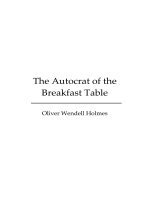The Wreck Of The Golden Mary (dodo Press) By Charles Dickens pdf
Bạn đang xem bản rút gọn của tài liệu. Xem và tải ngay bản đầy đủ của tài liệu tại đây (171.06 KB, 45 trang )
The Wreck
of the Golden Mary
Charles Dickens
The Wreck of the Golden Mary
1
THE WRECK
I was apprenticed to the Sea when I was twelve years old,
and I have encountered a great deal of rough weather,
both literal and metaphorical. It has always been my
opinion since I first possessed such a thing as an opinion,
that the man who knows only one subject is next
tiresome to the man who knows no subject. Therefore, in
the course of my life I have taught myself whatever I
could, and although I am not an educated man, I am able,
I am thankful to say, to have an intelligent interest in
most things.
A person might suppose, from reading the above, that I
am in the habit of holding forth about number one. That
is not the case. Just as if I was to come into a room among
strangers, and must either be introduced or introduce
myself, so I have taken the liberty of passing these few
remarks, simply and plainly that it may be known who
and what I am. I will add no more of the sort than that
my name is William George Ravender, that I was born at
Penrith half a year after my own father was drowned,
and that I am on the second day of this present blessed
Christmas week of one thousand eight hundred and fifty-
six, fifty-six years of age.
When the rumour first went flying up and down that
there was gold in California—which, as most people
know, was before it was discovered in the British colony
of Australia—I was in the West Indies, trading among the
Islands. Being in command and likewise part-owner of a
The Wreck of the Golden Mary
2
smart schooner, I had my work cut out for me, and I was
doing it. Consequently, gold in California was no
business of mine.
But, by the time when I came home to England again, the
thing was as clear as your hand held up before you at
noon-day. There was Californian gold in the museums
and in the goldsmiths’ shops, and the very first time I
went upon ‘Change, I met a friend of mine (a seafaring
man like myself), with a Californian nugget hanging to
his watch-chain. I handled it. It was as like a peeled
walnut with bits unevenly broken off here and there, and
then electrotyped all over, as ever I saw anything in my
life.
I am a single man (she was too good for this world and
for me, and she died six weeks before our marriage-day),
so when I am ashore, I live in my house at Poplar. My
house at Poplar is taken care of and kept ship- shape by
an old lady who was my mother’s maid before I was
born. She is as handsome and as upright as any old lady
in the world. She is as fond of me as if she had ever had
an only son, and I was he. Well do I know wherever I sail
that she never lays down her head at night without
having said, “Merciful Lord! bless and preserve William
George Ravender, and send him safe home, through
Christ our Saviour! “ I have thought of it in many a
dangerous moment, when it has done me no harm, I am
sure.
In my house at Poplar, along with this old lady, I lived
quiet for best part of a year: having had a long spell of it
The Wreck of the Golden Mary
3
among the Islands, and having (which was very
uncommon in me) taken the fever rather badly. At last,
being strong and hearty, and having read every book I
could lay hold of, right out, I was walking down
Leadenhall Street in the City of London, thinking of
turning-to again, when I met what I call Smithick and
Watersby of Liverpool. I chanced to lift up my eyes from
looking in at a ship’s chronometer in a window, and I
saw him bearing down upon me, head on.
It is, personally, neither Smithick, nor Watersby, that I
here mention, nor was I ever acquainted with any man of
either of those names, nor do I think that there has been
any one of either of those names in that Liverpool House
for years back. But, it is in reality the House itself that I
refer to; and a wiser merchant or a truer gentleman never
stepped.
“My dear Captain Ravender, “ says he. “Of all the men
on earth, I wanted to see you most. I was on my way to
you. “
“Well! “ says I. “That looks as if you were to see me, don’t
it? “ With that I put my arm in his, and we walked on
towards the Royal Exchange, and when we got there,
walked up and down at the back of it where the Clock-
Tower is. We walked an hour and more, for he had much
to say to me. He had a scheme for chartering a new ship
of their own to take out cargo to the diggers and
emigrants in California, and to buy and bring back gold.
Into the particulars of that scheme I will not enter, and I
have no right to enter. All I say of it is, that it was a very
The Wreck of the Golden Mary
4
original one, a very fine one, a very sound one, and a
very lucrative one beyond doubt.
He imparted it to me as freely as if I had been a part of
himself. After doing so, he made me the handsomest
sharing offer that ever was made to me, boy or man—or I
believe to any other captain in the Merchant Navy—and
he took this round turn to finish with:
“Ravender, you are well aware that the lawlessness of
that coast and country at present, is as special as the
circumstances in which it is placed. Crews of vessels
outward-bound, desert as soon as they make the land;
crews of vessels homeward-bound, ship at enormous
wages, with the express intention of murdering the
captain and seizing the gold freight; no man can trust
another, and the devil seems let loose. Now, “ says he,
“you know my opinion of you, and you know I am only
expressing it, and with no singularity, when I tell you
that you are almost the only man on whose integrity,
discretion, and energy—” &c., &c. For, I don’t want to
repeat what he said, though I was and am sensible of it.
Notwithstanding my being, as I have mentioned, quite
ready for a voyage, still I had some doubts of this
voyage. Of course I knew, without being told, that there
were peculiar difficulties and dangers in it, a long way
over and above those which attend all voyages. It must
not be supposed that I was afraid to face them; but, in my
opinion a man has no manly motive or sustainment in his
own breast for facing dangers, unless he has well
considered what they are, and is able quietly to say to
The Wreck of the Golden Mary
5
himself, “None of these perils can now take me by
surprise; I shall know what to do for the best in any of
them; all the rest lies in the higher and greater hands to
which I humbly commit myself. “ On this principle I
have so attentively considered (regarding it as my duty)
all the hazards I have ever been able to think of, in the
ordinary way of storm, shipwreck, and fire at sea, that I
hope I should be prepared to do, in any of those cases,
whatever could be done, to save the lives intrusted to my
charge.
As I was thoughtful, my good friend proposed that he
should leave me to walk there as long as I liked, and that
I should dine with him by-and-by at his club in Pall Mall.
I accepted the invitation and I walked up and down
there, quarter-deck fashion, a matter of a couple of hours;
now and then looking up at the weathercock as I might
have looked up aloft; and now and then taking a look
into Cornhill, as I might have taken a look over the side.
All dinner-time, and all after dinner-time, we talked it
over again. I gave him my views of his plan, and he very
much approved of the same. I told him I had nearly
decided, but not quite. “Well, well, “ says he, “come
down to Liverpool to-morrow with me, and see the
Golden Mary. “ I liked the name (her name was Mary,
and she was golden, if golden stands for good), so I
began to feel that it was almost done when I said I would
go to Liverpool. On the next morning but one we were on
board the Golden Mary. I might have known, from his
asking me to come down and see her, what she was. I
The Wreck of the Golden Mary
6
declare her to have been the completest and most
exquisite Beauty that ever I set my eyes upon.
We had inspected every timber in her, and had come
back to the gangway to go ashore from the dock-basin,
when I put out my hand to my friend. “Touch upon it, “
says I, “and touch heartily. I take command of this ship,
and I am hers and yours, if I can get John Steadiman for
my chief mate. “
John Steadiman had sailed with me four voyages. The
first voyage John was third mate out to China, and came
home second. The other three voyages he was my first
officer. At this time of chartering the Golden Mary, he
was aged thirty-two. A brisk, bright, blue-eyed fellow, a
very neat figure and rather under the middle size, never
out of the way and never in it, a face that pleased
everybody and that all children took to, a habit of going
about singing as cheerily as a blackbird, and a perfect
sailor.
We were in one of those Liverpool hackney-coaches in
less than a minute, and we cruised about in her upwards
of three hours, looking for John. John had come home
from Van Diemen’s Land barely a month before, and I
had heard of him as taking a frisk in Liverpool. We asked
after him, among many other places, at the two boarding-
houses he was fondest of, and we found he had had a
week’s spell at each of them; but, he had gone here and
gone there, and had set off “to lay out on the main-to’-
gallant- yard of the highest Welsh mountain” (so he had
told the people of the house), and where he might be
The Wreck of the Golden Mary
7
then, or when he might come back, nobody could tell us.
But it was surprising, to be sure, to see how every face
brightened the moment there was mention made of the
name of Mr. Steadiman.
We were taken aback at meeting with no better luck, and
we had wore ship and put her head for my friends, when
as we were jogging through the streets, I clap my eyes on
John himself coming out of a toyshop! He was carrying a
little boy, and conducting two uncommon pretty women
to their coach, and he told me afterwards that he had
never in his life seen one of the three before, but that he
was so taken with them on looking in at the toyshop
while they were buying the child a cranky Noah’s Ark,
very much down by the head, that he had gone in and
asked the ladies’ permission to treat him to a tolerably
correct Cutter there was in the window, in order that
such a handsome boy might not grow up with a lubberly
idea of naval architecture.
We stood off and on until the ladies’ coachman began to
give way, and then we hailed John. On his coming
aboard of us, I told him, very gravely, what I had said to
my friend. It struck him, as he said himself, amidships.
He was quite shaken by it. “Captain Ravender, “ were
John Steadiman’s words, “such an opinion from you is
true commendation, and I’ll sail round the world with
you for twenty years if you hoist the signal, and stand by
you for ever! “ And now indeed I felt that it was done,
and that the Golden Mary was afloat.
The Wreck of the Golden Mary
8
Grass never grew yet under the feet of Smithick and
Watersby. The riggers were out of that ship in a
fortnight’s time, and we had begun taking in cargo. John
was always aboard, seeing everything stowed with his
own eyes; and whenever I went aboard myself early or
late, whether he was below in the hold, or on deck at the
hatchway, or overhauling his cabin, nailing up pictures
in it of the Blush Roses of England, the Blue Belles of
Scotland, and the female Shamrock of Ireland: of a
certainty I heard John singing like a blackbird.
We had room for twenty passengers. Our sailing
advertisement was no sooner out, than we might have
taken these twenty times over. In entering our men, I and
John (both together) picked them, and we entered none
but good hands—as good as were to be found in that
port. And so, in a good ship of the best build, well
owned, well arranged, well officered, well manned, well
found in all respects, we parted with our pilot at a
quarter past four o’clock in the afternoon of the seventh
of March, one thousand eight hundred and fifty-one, and
stood with a fair wind out to sea.
It may be easily believed that up to that time I had had
no leisure to be intimate with my passengers. The most of
them were then in their berths sea-sick; however, in
going among them, telling them what was good for them,
persuading them not to be there, but to come up on deck
and feel the breeze, and in rousing them with a joke, or a
comfortable word, I made acquaintance with them,
perhaps, in a more friendly and confidential way from
the first, than I might have done at the cabin table.
The Wreck of the Golden Mary
9
Of my passengers, I need only particularise, just at
present, a bright- eyed blooming young wife who was
going out to join her husband in California, taking with
her their only child, a little girl of three years old, whom
he had never seen; a sedate young woman in black, some
five years older (about thirty as I should say), who was
going out to join a brother; and an old gentleman, a good
deal like a hawk if his eyes had been better and not so
red, who was always talking, morning, noon, and night,
about the gold discovery. But, whether he was making
the voyage, thinking his old arms could dig for gold, or
whether his speculation was to buy it, or to barter for it,
or to cheat for it, or to snatch it anyhow from other
people, was his secret. He kept his secret.
These three and the child were the soonest well. The
child was a most engaging child, to be sure, and very
fond of me: though I am bound to admit that John
Steadiman and I were borne on her pretty little books in
reverse order, and that he was captain there, and I was
mate. It was beautiful to watch her with John, and it was
beautiful to watch John with her. Few would have
thought it possible, to see John playing at bo-peep round
the mast, that he was the man who had caught up an iron
bar and struck a Malay and a Maltese dead, as they were
gliding with their knives down the cabin stair aboard the
barque Old England, when the captain lay ill in his cot,
off Saugar Point. But he was; and give him his back
against a bulwark, he would have done the same by half
a dozen of them. The name of the young mother was
Mrs. Atherfield, the name of the young lady in black was
The Wreck of the Golden Mary
10
Miss Coleshaw, and the name of the old gentleman was
Mr. Rarx.
As the child had a quantity of shining fair hair, clustering
in curls all about her face, and as her name was Lucy,
Steadiman gave her the name of the Golden Lucy. So, we
had the Golden Lucy and the Golden Mary; and John
kept up the idea to that extent as he and the child went
playing about the decks, that I believe she used to think
the ship was alive somehow—a sister or companion,
going to the same place as herself. She liked to be by the
wheel, and in fine weather, I have often stood by the man
whose trick it was at the wheel, only to hear her, sitting
near my feet, talking to the ship. Never had a child such a
doll before, I suppose; but she made a doll of the Golden
Mary, and used to dress her up by tying ribbons and
little bits of finery to the belaying-pins; and nobody ever
moved them, unless it was to save them from being
blown away.
Of course I took charge of the two young women, and I
called them “my dear, “ and they never minded,
knowing that whatever I said was said in a fatherly and
protecting spirit. I gave them their places on each side of
me at dinner, Mrs. Atherfield on my right and Miss
Coleshaw on my left; and I directed the unmarried lady
to serve out the breakfast, and the married lady to serve
out the tea. Likewise I said to my black steward in their
presence, “Tom Snow, these two ladies are equally the
mistresses of this house, and do you obey their orders
equally; “ at which Tom laughed, and they all laughed.
The Wreck of the Golden Mary
11
Old Mr. Rarx was not a pleasant man to look at, nor yet
to talk to, or to be with, for no one could help seeing that
he was a sordid and selfish character, and that he had
warped further and further out of the straight with time.
Not but what he was on his best behaviour with us, as
everybody was; for we had no bickering among us,
for’ard or aft. I only mean to say, he was not the man one
would have chosen for a messmate. If choice there had
been, one might even have gone a few points out of one’s
course, to say, “No! Not him! “ But, there was one
curious inconsistency in Mr. Rarx. That was, that he took
an astonishing interest in the child. He looked, and I may
add, he was, one of the last of men to care at all for a
child, or to care much for any human creature. Still, he
went so far as to be habitually uneasy, if the child was
long on deck, out of his sight. He was always afraid of
her falling overboard, or falling down a hatchway, or of a
block or what not coming down upon her from the
rigging in the working of the ship, or of her getting some
hurt or other. He used to look at her and touch her, as if
she was something precious to him. He was always
solicitous about her not injuring her health, and
constantly entreated her mother to be careful of it. This
was so much the more curious, because the child did not
like him, but used to shrink away from him, and would
not even put out her hand to him without coaxing from
others. I believe that every soul on board frequently
noticed this, and not one of us understood it. However, it
was such a plain fact, that John Steadiman said more
than once when old Mr. Rarx was not within earshot, that
if the Golden Mary felt a tenderness for the dear old
The Wreck of the Golden Mary
12
gentleman she carried in her lap, she must be bitterly
jealous of the Golden Lucy.
Before I go any further with this narrative, I will state
that our ship was a barque of three hundred tons,
carrying a crew of eighteen men, a second mate in
addition to John, a carpenter, an armourer or smith, and
two apprentices (one a Scotch boy, poor little fellow). We
had three boats; the Long-boat, capable of carrying
twenty-five men; the Cutter, capable of carrying fifteen;
and the Surf-boat, capable of carrying ten. I put down the
capacity of these boats according to the numbers they
were really meant to hold.
We had tastes of bad weather and head-winds, of course;
but, on the whole we had as fine a run as any reasonable
man could expect, for sixty days. I then began to enter
two remarks in the ship’s Log and in my Journal; first,
that there was an unusual and amazing quantity of ice;
second, that the nights were most wonderfully dark, in
spite of the ice.
For five days and a half, it seemed quite useless and
hopeless to alter the ship’s course so as to stand out of the
way of this ice. I made what southing I could; but, all that
time, we were beset by it. Mrs. Atherfield after standing
by me on deck once, looking for some time in an awed
manner at the great bergs that surrounded us, said in a
whisper, “O! Captain Ravender, it looks as if the whole
solid earth had changed into ice, and broken up! “ I said
to her, laughing, “I don’t wonder that it does, to your
inexperienced eyes, my dear. “ But I had never seen a
The Wreck of the Golden Mary
13
twentieth part of the quantity, and, in reality, I was pretty
much of her opinion.
However, at two p. m. on the afternoon of the sixth day,
that is to say, when we were sixty-six days out, John
Steadiman who had gone aloft, sang out from the top,
that the sea was clear ahead. Before four p. m. a strong
breeze springing up right astern, we were in open water
at sunset. The breeze then freshening into half a gale of
wind, and the Golden Mary being a very fast sailer, we
went before the wind merrily, all night.
I had thought it impossible that it could be darker than it
had been, until the sun, moon, and stars should fall out
of the Heavens, and Time should be destroyed; but, it
had been next to light, in comparison with what it was
now. The darkness was so profound, that looking into it
was painful and oppressive—like looking, without a ray
of light, into a dense black bandage put as close before
the eyes as it could be, without touching them. I doubled
the look-out, and John and I stood in the bow side-by-
side, never leaving it all night. Yet I should no more have
known that he was near me when he was silent, without
putting out my arm and touching him, than I should if he
had turned in and been fast asleep below. We were not so
much looking out, all of us, as listening to the utmost,
both with our eyes and ears.
Next day, I found that the mercury in the barometer,
which had risen steadily since we cleared the ice,
remained steady. I had had very good observations, with
now and then the interruption of a day or so, since our
The Wreck of the Golden Mary
14
departure. I got the sun at noon, and found that we were
in Lat. 58 degrees S., Long. 60 degrees W., off New South
Shetland; in the neighbourhood of Cape Horn. We were
sixty-seven days out, that day. The ship’s reckoning was
accurately worked and made up. The ship did her duty
admirably, all on board were well, and all hands were as
smart, efficient, and contented, as it was possible to be.
When the night came on again as dark as before, it was
the eighth night I had been on deck. Nor had I taken
more than a very little sleep in the day-time, my station
being always near the helm, and often at it, while we
were among the ice. Few but those who have tried it can
imagine the difficulty and pain of only keeping the eyes
open—physically open—under such circumstances, in
such darkness. They get struck by the darkness, and
blinded by the darkness. They make patterns in it, and
they flash in it, as if they had gone out of your head to
look at you. On the turn of midnight, John Steadiman,
who was alert and fresh (for I had always made him turn
in by day), said to me, “Captain Ravender, I entreat of
you to go below. I am sure you can hardly stand, and
your voice is getting weak, sir. Go below, and take a little
rest. I’ll call you if a block chafes. “ I said to John in
answer, “Well, well, John! Let us wait till the turn of one
o’clock, before we talk about that. “ I had just had one of
the ship’s lanterns held up, that I might see how the night
went by my watch, and it was then twenty minutes after
twelve.
At five minutes before one, John sang out to the boy to
bring the lantern again, and when I told him once more
The Wreck of the Golden Mary
15
what the time was, entreated and prayed of me to go
below. “Captain Ravender, “ says he, “all’s well; we can’t
afford to have you laid up for a single hour; and I
respectfully and earnestly beg of you to go below. “ The
end of it was, that I agreed to do so, on the
understanding that if I failed to come up of my own
accord within three hours, I was to be punctually called.
Having settled that, I left John in charge. But I called him
to me once afterwards, to ask him a question. I had been
to look at the barometer, and had seen the mercury still
perfectly steady, and had come up the companion again
to take a last look about me—if I can use such a word in
reference to such darkness—when I thought that the
waves, as the Golden Mary parted them and shook them
off, had a hollow sound in them; something that I fancied
was a rather unusual reverberation. I was standing by the
quarter-deck rail on the starboard side, when I called
John aft to me, and bade him listen. He did so with the
greatest attention. Turning to me he then said, “Rely
upon it, Captain Ravender, you have been without rest
too long, and the novelty is only in the state of your sense
of hearing. “ I thought so too by that time, and I think so
now, though I can never know for absolute certain in this
world, whether it was or not.
When I left John Steadiman in charge, the ship was still
going at a great rate through the water. The wind still
blew right astern. Though she was making great way, she
was under shortened sail, and had no more than she
could easily carry. All was snug, and nothing
complained. There was a pretty sea running, but not a
very high sea neither, nor at all a confused one.
The Wreck of the Golden Mary
16
I turned in, as we seamen say, all standing. The meaning
of that is, I did not pull my clothes off—no, not even so
much as my coat: though I did my shoes, for my feet
were badly swelled with the deck. There was a little
swing-lamp alight in my cabin. I thought, as I looked at it
before shutting my eyes, that I was so tired of darkness,
and troubled by darkness, that I could have gone to sleep
best in the midst of a million of flaming gas-lights. That
was the last thought I had before I went off, except the
prevailing thought that I should not be able to get to
sleep at all.
I dreamed that I was back at Penrith again, and was
trying to get round the church, which had altered its
shape very much since I last saw it, and was cloven all
down the middle of the steeple in a most singular
manner. Why I wanted to get round the church I don’t
know; but I was as anxious to do it as if my life depended
on it. Indeed, I believe it did in the dream. For all that, I
could not get round the church. I was still trying, when I
came against it with a violent shock, and was flung out of
my cot against the ship’s side. Shrieks and a terrific
outcry struck me far harder than the bruising timbers,
and amidst sounds of grinding and crashing, and a heavy
rushing and breaking of water—sounds I understood too
well—I made my way on deck. It was not an easy thing
to do, for the ship heeled over frightfully, and was
beating in a furious manner.
I could not see the men as I went forward, but I could
hear that they were hauling in sail, in disorder. I had my
trumpet in my hand, and, after directing and
The Wreck of the Golden Mary
17
encouraging them in this till it was done, I hailed first
John Steadiman, and then my second mate, Mr. William
Rames. Both answered clearly and steadily. Now, I had
practised them and all my crew, as I have ever made it a
custom to practise all who sail with me, to take certain
stations and wait my orders, in case of any unexpected
crisis. When my voice was heard hailing, and their voices
were heard answering, I was aware, through all the
noises of the ship and sea, and all the crying of the
passengers below, that there was a pause. “Are you
ready, Rames? “—”Ay, ay, sir! “—”Then light up, for
God’s sake! “ In a moment he and another were burning
blue-lights, and the ship and all on board seemed to be
enclosed in a mist of light, under a great black dome.
The light shone up so high that I could see the huge
Iceberg upon which we had struck, cloven at the top and
down the middle, exactly like Penrith Church in my
dream. At the same moment I could see the watch last
relieved, crowding up and down on deck; I could see
Mrs. Atherfield and Miss Coleshaw thrown about on the
top of the companion as they struggled to bring the child
up from below; I could see that the masts were going
with the shock and the beating of the ship; I could see the
frightful breach stove in on the starboard side, half the
length of the vessel, and the sheathing and timbers
spirting up; I could see that the Cutter was disabled, in a
wreck of broken fragments; and I could see every eye
turned upon me. It is my belief that if there had been ten
thousand eyes there, I should have seen them all, with
their different looks. And all this in a moment. But you
must consider what a moment.
The Wreck of the Golden Mary
18
I saw the men, as they looked at me, fall towards their
appointed stations, like good men and true. If she had
not righted, they could have done very little there or
anywhere but die—not that it is little for a man to die at
his post—I mean they could have done nothing to save
the passengers and themselves. Happily, however, the
violence of the shock with which we had so determinedly
borne down direct on that fatal Iceberg, as if it had been
our destination instead of our destruction, had so
smashed and pounded the ship that she got off in this
same instant and righted. I did not want the carpenter to
tell me she was filling and going down; I could see and
hear that. I gave Rames the word to lower the Long-boat
and the Surf-boat, and I myself told off the men for each
duty. Not one hung back, or came before the other. I now
whispered to John Steadiman, “John, I stand at the
gangway here, to see every soul on board safe over the
side. You shall have the next post of honour, and shall be
the last but one to leave the ship. Bring up the
passengers, and range them behind me; and put what
provision and water you can got at, in the boats. Cast
your eye for’ard, John, and you’ll see you have not a
moment to lose. “
My noble fellows got the boats over the side as orderly as
I ever saw boats lowered with any sea running, and,
when they were launched, two or three of the nearest
men in them as they held on, rising and falling with the
swell, called out, looking up at me, “Captain Ravender, if
anything goes wrong with us, and you are saved,
remember we stood by you! “—”We’ll all stand by one
The Wreck of the Golden Mary
19
another ashore, yet, please God, my lads! “ says I. “Hold
on bravely, and be tender with the women. “
The women were an example to us. They trembled very
much, but they were quiet and perfectly collected. “Kiss
me, Captain Ravender, “ says Mrs. Atherfield, “and God
in heaven bless you, you good man! “ “My dear, “ says I,
“those words are better for me than a life-boat. “ I held
her child in my arms till she was in the boat, and then
kissed the child and handed her safe down. I now said to
the people in her, “You have got your freight, my lads, all
but me, and I am not coming yet awhile. Pull away from
the ship, and keep off! “
That was the Long-boat. Old Mr. Rarx was one of her
complement, and he was the only passenger who had
greatly misbehaved since the ship struck. Others had
been a little wild, which was not to be wondered at, and
not very blamable; but, he had made a lamentation and
uproar which it was dangerous for the people to hear, as
there is always contagion in weakness and selfishness.
His incessant cry had been that he must not be separated
from the child, that he couldn’t see the child, and that he
and the child must go together. He had even tried to
wrest the child out of my arms, that he might keep her in
his. “Mr. Rarx, “ said I to him when it came to that, “I
have a loaded pistol in my pocket; and if you don’t stand
out of the gangway, and keep perfectly quiet, I shall
shoot you through the heart, if you have got one. “ Says
he, “You won’t do murder, Captain Ravender! “ “No, sir,
“ says I, “I won’t murder forty-four people to humour
you, but I’ll shoot you to save them. “ After that he was
The Wreck of the Golden Mary
20
quiet, and stood shivering a little way off, until I named
him to go over the side.
The Long-boat being cast off, the Surf-boat was soon
filled. There only remained aboard the Golden Mary,
John Mullion the man who had kept on burning the blue-
lights (and who had lighted every new one at every old
one before it went out, as quietly as if he had been at an
illumination); John Steadiman; and myself. I hurried
those two into the Surf-boat, called to them to keep off,
and waited with a grateful and relieved heart for the
Long-boat to come and take me in, if she could. I looked
at my watch, and it showed me, by the blue-light, ten
minutes past two. They lost no time. As soon as she was
near enough, I swung myself into her, and called to the
men, “With a will, lads! She’s reeling! “ We were not an
inch too far out of the inner vortex of her going down,
when, by the blue-light which John Mullion still burnt in
the bow of the Surf-boat, we saw her lurch, and plunge to
the bottom head-foremost. The child cried, weeping
wildly, “O the dear Golden Mary! O look at her! Save
her! Save the poor Golden Mary! “ And then the light
burnt out, and the black dome seemed to come down
upon us.
I suppose if we had all stood a-top of a mountain, and
seen the whole remainder of the world sink away from
under us, we could hardly have felt more shocked and
solitary than we did when we knew we were alone on
the wide ocean, and that the beautiful ship in which most
of us had been securely asleep within half an hour was
gone for ever. There was an awful silence in our boat,
The Wreck of the Golden Mary
21
and such a kind of palsy on the rowers and the man at
the rudder, that I felt they were scarcely keeping her
before the sea. I spoke out then, and said, “Let every one
here thank the Lord for our preservation! “ All the voices
answered (even the child’s), “We thank the Lord! “ I then
said the Lord’s Prayer, and all hands said it after me with
a solemn murmuring. Then I gave the word “Cheerily, O
men, Cheerily! “ and I felt that they were handling the
boat again as a boat ought to be handled.
The Surf-boat now burnt another blue-light to show us
where they were, and we made for her, and laid
ourselves as nearly alongside of her as we dared. I had
always kept my boats with a coil or two of good stout
stuff in each of them, so both boats had a rope at hand.
We made a shift, with much labour and trouble, to got
near enough to one another to divide the blue-lights
(they were no use after that night, for the sea-water soon
got at them), and to get a tow-rope out between us. All
night long we kept together, sometimes obliged to cast
off the rope, and sometimes getting it out again, and all
of us wearying for the morning—which appeared so long
in coming that old Mr. Rarx screamed out, in spite of his
fears of me, “The world is drawing to an end, and the
sun will never rise any more! “
When the day broke, I found that we were all huddled
together in a miserable manner. We were deep in the
water; being, as I found on mustering, thirty-one in
number, or at least six too many. In the Surf- boat they
were fourteen in number, being at least four too many.
The first thing I did, was to get myself passed to the
The Wreck of the Golden Mary
22
rudder—which I took from that time—and to get Mrs.
Atherfield, her child, and Miss Coleshaw, passed on to sit
next me. As to old Mr. Rarx, I put him in the bow, as far
from us as I could. And I put some of the best men near
us in order that if I should drop there might be a skilful
hand ready to take the helm.
The sea moderating as the sun came up, though the sky
was cloudy and wild, we spoke the other boat, to know
what stores they had, and to overhaul what we had. I
had a compass in my pocket, a small telescope, a double-
barrelled pistol, a knife, and a fire-box and matches. Most
of my men had knives, and some had a little tobacco:
some, a pipe as well. We had a mug among us, and an
iron spoon. As to provisions, there were in my boat two
bags of biscuit, one piece of raw beef, one piece of raw
pork, a bag of coffee, roasted but not ground (thrown in,
I imagine, by mistake, for something else), two small
casks of water, and about half-a- gallon of rum in a keg.
The Surf-boat, having rather more rum than we, and
fewer to drink it, gave us, as I estimated, another quart
into our keg. In return, we gave them three double
handfuls of coffee, tied up in a piece of a handkerchief;
they reported that they had aboard besides, a bag of
biscuit, a piece of beef, a small cask of water, a small box
of lemons, and a Dutch cheese. It took a long time to
make these exchanges, and they were not made without
risk to both parties; the sea running quite high enough to
make our approaching near to one another very
hazardous. In the bundle with the coffee, I conveyed to
John Steadiman (who had a ship’s compass with him), a
paper written in pencil, and torn from my pocket-book,
The Wreck of the Golden Mary
23
containing the course I meant to steer, in the hope of
making land, or being picked up by some vessel—I say in
the hope, though I had little hope of either deliverance. I
then sang out to him, so as all might hear, that if we two
boats could live or die together, we would; but, that if we
should be parted by the weather, and join company no
more, they should have our prayers and blessings, and
we asked for theirs. We then gave them three cheers,
which they returned, and I saw the men’s heads droop in
both boats as they fell to their oars again.
These arrangements had occupied the general attention
advantageously for all, though (as I expressed in the last
sentence) they ended in a sorrowful feeling. I now said a
few words to my fellow-voyagers on the subject of the
small stock of food on which our lives depended if they
were preserved from the great deep, and on the rigid
necessity of our eking it out in the most frugal manner.
One and all replied that whatever allowance I thought
best to lay down should be strictly kept to. We made a
pair of scales out of a thin scrap of iron-plating and some
twine, and I got together for weights such of the heaviest
buttons among us as I calculated made up some fraction
over two ounces. This was the allowance of solid food
served out once a-day to each, from that time to the end;
with the addition of a coffee-berry, or sometimes half a
one, when the weather was very fair, for breakfast. We
had nothing else whatever, but half a pint of water each
per day, and sometimes, when we were coldest and
weakest, a teaspoonful of rum each, served out as a
dram. I know how learnedly it can be shown that rum is
poison, but I also know that in this case, as in all similar









